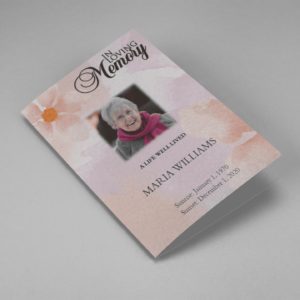Funeral programs serve as a cherished keepsake, providing a tangible reminder of a loved one’s life and the memories shared. Including poems in these programs can offer comfort, reflection, and a tribute to the deceased. Whether you’re seeking inspiration for poems to include or wondering how to integrate them into your funeral program, this guide will provide insights and examples to help you create a meaningful tribute.
Why Include Poems in Funeral Programs?
Funeral Poem have a unique way of expressing emotions and sentiments that may be difficult to put into words. Including poems in a funeral program can:
- Express Feelings: Poems can convey love, grief, gratitude, and other complex emotions that mourners may be experiencing.
- Provide Comfort: Reading or hearing a comforting poem can offer solace and support during a difficult time.
- Celebrate Life: Poems can celebrate the life, personality, and achievements of the deceased, highlighting their unique qualities and impact.
- Create a Personal Touch: Selecting poems that resonate with the deceased or reflect their interests can personalize the funeral program.
Choosing Poems for a Funeral Program
Selecting the right poems for a funeral program is a deeply personal process. Consider the following tips:
- Reflect on the Deceased: Think about the personality, interests, and values of the deceased. Choose poems that reflect who they were.
- Consider the Audience: Keep the audience in mind when selecting poems. Choose ones that will resonate with those attending the service.
- Length and Tone: Consider the length and tone of the poems. Opt for shorter poems for brevity and select a tone that is respectful and appropriate for the occasion.
- Theme or Message: Choose poems that convey a meaningful message or theme related to life, loss, love, or spirituality.
Examples of Poems for Funeral Programs
Here are some examples of poems that are often included in funeral programs:
“Do Not Stand at My Grave and Weep” by Mary Elizabeth Frye
Do not stand at my grave and weep,
I am not there; I do not sleep.
I am a thousand winds that blow,
I am the diamond glints on snow,
I am the sunlight on ripened grain,
I am the gentle autumn rain.
“Remember Me” by Margaret Mead
To the living, I am gone,
To the sorrowful, I will never return,
To the angry, I was cheated,
But to the happy, I am at peace,
And to the faithful, I have never left.
“She Is Gone” by David Harkins
You can shed tears that she is gone,
Or you can smile because she has lived.
You can close your eyes and pray that she will come back,
Or you can open your eyes and see all that she has left.
Funeral Templates
-
Searching for a Oak Leaf With Gold Oval Frame Half Page Funeral Program that is easy to print and amass and has a cutting-edge look? The Oak Leaf With Gold Oval Frame Half Page Funeral Program is the Perfect decision because it measures 8.5”x 5.5”.
- No Limitation on Content, Edit anything
- Edit anytime – unlimited revisions even after purchased
- Get a printable PDF downloaded to get it printed on your own.
-
Searching for a Brown and White Classic Funeral Program Half Page Program that is easy to print and amass and has a cutting-edge look? The Brown and White Classic Funeral Program Half Page Program is the Perfect decision because it measures 8.5”x 5.5”.
- No Limitation on Content, Edit anything
- Edit anytime – unlimited revisions even after purchased
- Get a printable PDF downloaded to get it printed on your own.
-
Searching for a Purple Elegant Watercolor Half Page Funeral Program Template that is easy to print and amass and has a cutting-edge look? The Purple Elegant Watercolor Half Page Funeral Program Template is the Perfect decision because it measures 8.5”x 5.5”.
- No Limitation on Content, Edit anything
- Edit anytime – unlimited revisions even after purchased
- Get a printable PDF downloaded to get it printed on your own.
-
Searching for a Cream and Green Photo Obituary Half Page Program that is easy to print and amass and has a cutting-edge look? The Cream and Green Photo Obituary Half Page Program is the Perfect decision because it measures 8.5”x 5.5”.
- No Limitation on Content, Edit anything
- Edit anytime – unlimited revisions even after purchased
- Get a printable PDF downloaded to get it printed on your own.
-
Searching for a Cream Simple Elegant Photo Church Half Page Program that is easy to print and amass and has a cutting-edge look? The Cream Simple Elegant Photo Church Half Page Program is the Perfect decision because it measures 8.5”x 5.5”.
- No Limitation on Content, Edit anything
- Edit anytime – unlimited revisions even after purchased
- Get a printable PDF downloaded to get it printed on your own.
-
Searching for a Samovar Silver Half Page Funeral Program Template that is easy to print and amass and has a cutting-edge look? The Samovar Silver Half Page Funeral Program Template is the Perfect decision because it measures 8.5”x 5.5”.
- No Limitation on Content, Edit anything
- Edit anytime – unlimited revisions even after purchased
- Get a printable PDF downloaded to get it printed on your own.
-
Searching for an Elegant Beige Half Page Funeral Program Template that is easy to print and amass and has a cutting-edge look? The Elegant Beige Half-Page Funeral Program Template is the Perfect decision because it measures 8.5”x 5.5”.
- No Limitation on Content, Edit anything
- Edit anytime – unlimited revisions even after purchased
- Get a printable PDF downloaded to get it printed on your own.
-
Searching for a White Floral Pro Half Page Funeral Program Template that is easy to print and amass and has a cutting-edge look? White Floral Pro Half Page Funeral Program Template is the Perfect decision because it measures 8.5”x 5.5”.
- No Limitation on Content, Edit anything
- Edit anytime – unlimited revisions even after purchased
- Get a printable PDF downloaded to get it printed on your own.
-
Searching for a Grey and Burgundy Elegant Half Page Funeral Program Template that is easy to print and amass and has a cutting-edge look? Grey and Burgundy Elegant Half Page Funeral Program Template is the Perfect decision because it measures 8.5”x 5.5”.
- No Limitation on Content, Edit anything
- Edit anytime – unlimited revisions even after purchased
- Get a printable PDF downloaded to get it printed on your own.
-
Searching for a Soft Green and Grey Minimalist Floral Half Page Funeral Program Template that is easy to print and amass and has a cutting-edge look? Soft Green and Grey Minimalist Floral Half Page Funeral Program Template is the Perfect decision because it measures 8.5”x 5.5”.
- No Limitation on Content, Edit anything
- Edit anytime – unlimited revisions even after purchased
- Get a printable PDF downloaded to get it printed on your own.
-
Searching for a Gray Elegant Oval Frame Half Page Funeral Program Template that is easy to print and amass and has a cutting-edge look? Gray Elegant Oval Frame Half Page Funeral Program Template is the Perfect decision because it measures 8.5”x 5.5”.
- No Limitation on Content, Edit anything
- Edit anytime – unlimited revisions even after purchased
- Get a printable PDF downloaded to get it printed on your own.
-
Searching for a Blue Organic Minimal Half Page Funeral Program Template that is easy to print and amass and has a cutting-edge look? Blue Organic Minimal Half Page Funeral Program Template is the Perfect decision because it measures 8.5”x 5.5”.
- No Limitation on Content, Edit anything
- Edit anytime – unlimited revisions even after purchased
- Get a printable PDF downloaded to get it printed on your own.
-
Searching for a Pink and Orange Watercolour Half Page Funeral Program Template that is easy to print and amass and has a cutting-edge look? Pink and Orange Watercolour Half Page Funeral Program Template is the Perfect decision because it measures 8.5”x 5.5”.
- No Limitation on Content, Edit anything
- Edit anytime – unlimited revisions even after purchased
- Get a printable PDF downloaded to get it printed on your own.
-
Searching for a Pink Floral Paper Half Page Funeral Program Template that is easy to print and amass and has a cutting-edge look? Pink Floral Paper Half Page Funeral Program Template is the Perfect decision because it measures 8.5”x 5.5”.
- No Limitation on Content, Edit anything
- Edit anytime – unlimited revisions even after purchased
- Get a printable PDF downloaded to get it printed on your own.
Funeral Programs : Helping Videos
Frequently Asked Questions On Funeral Programs Poems
Why include poems in a funeral program?
Including poems in a funeral program can provide comfort, express emotions, celebrate the life of the deceased, and create a personal touch.
How do I choose poems for a funeral program?
Consider the personality and interests of the deceased, the audience, the length and tone of the poems, and the theme or message you want to convey.
What are some examples of poems for a funeral program?
Some examples include “Do Not Stand at My Grave and Weep” by Mary Elizabeth Frye, “Remember Me” by Margaret Mead, and “She Is Gone” by David Harkins.
How should poems be formatted in a funeral program?
Use a legible font and consider using a different style or color to make the poem stand out. Include the author’s name at the end of the poem to give credit.















